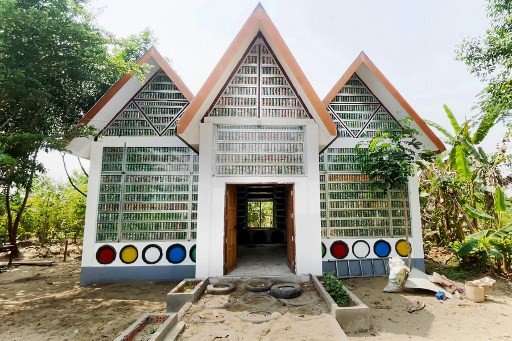Popular Reads
Top Results
Can't find what you're looking for?
View all search resultsPopular Reads
Top Results
Can't find what you're looking for?
View all search resultsEco brick library for Myanmar orphans faces coup delays
Library for orphans in Yangon, built of recycled plastic waste, has been indefinitely deferred its opening by Myanmar's bloody coup.
Change text size
Gift Premium Articles
to Anyone
A
humble library for orphans in Yangon, built of recycled plastic waste, stands empty without books or archives. It was supposed to start welcoming young readers earlier this year, but its opening has been indefinitely deferred by Myanmar's bloody coup.
For many, environmental concerns have taken a back seat to the broader fight for democracy.
The library project at Taikkyi, a neighbourhood in the north of Myanmar's biggest city, started in December 2020 as a venture of the NGO Clean Yangon and has drawn on plastic rubbish donations from the local community.
It looks like a dolls' house with its A-frame roof and multi-coloured walls made of "eco-bricks" within metal frames.
Teams of volunteers made the bricks by cutting plastic waste such as old crisp packets -- which can take hundreds of years to break down -- into thin strips and stuffing them tightly into soft drinks bottles.
"It takes at least about one hour to make a one-litre eco-brick. We used 5,000 eco-bricks to make this building," volunteer Zay Yar Tun told AFP.
The library had been expected to open this year, but Myanmar has been in turmoil and its economy paralysed since civilian leader Aung San Suu Kyi was ousted from power on February 1.
The move ended the country's 10-year experiment with democracy after half a century under military rule.
But the civilian population has been unwilling to give up hard-won freedoms, staging mass protests and labour strikes, which the military has sought to crush with lethal force -- so far more than 800 people have been killed.
As a result of the ongoing unrest, it could be some time before the library is filled with children's books, laments Eric, another volunteer.
"Now everything is changing. We feel like we are losing our freedom and procedures are delayed because of the military dictatorship," he told AFP.
Still, the process of creating the library has been a valuable learning experience for the children at the orphanage.
"Children (here)... will not throw out plastic materials easily. We made this library in front of them, so they could learn (about saving the environment)," Eric said.
"The library can give them knowledge and wisdom for the rest of their lives."
In Myanmar, discarded plastic bags and bottles often litter roadsides and clog drains. According to one conservation group's survey, 119 tonnes of plastic waste enters the country's vital Ayeyarwady River every day, making it one of the most polluted waterways in the world.
Zan Zan Thae Oo, 27, who contributed 150 multi-coloured eco-bricks to the library project, is filled with pride over the finished product.
"I know more now about how to add value to waste materials," she told AFP.
Waste not, want not
The eco-brick trend began in Guatemala in 2005 -- as villages there grappled with plastic waste and no official rubbish dumps or waste collection systems.
The concept has since gone global.
Six years ago, Myanmar's Badana Aid Foundation began building classrooms out of eco-bricks, first at a school south of the ancient city of Bagan, followed by another near Inle Lake in 2018.
The charity is now building a third eco-brick school in Yangon's Hlaing Thar Yar township.
It is expected to be finished in July and will have three classrooms to cater for up to 90 pupils.
Unlike the eco-brick library with its exposed bottles, the charity renders the plastic bottles with concrete.
"If you look at it from the outside, the people would not know it was built with plastic bricks," donor and construction manager Win Thu Ya told AFP.
Eco-brick projects have dramatically changed community attitudes about rubbish, he said.
"People come to understand that plastic has a value and can be useful to build something with a (long-lasting legacy)".











